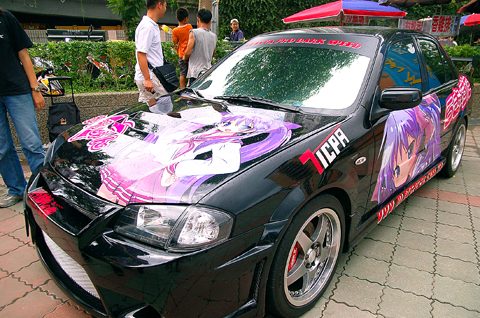If you happen to see cars or scooters on streets bearing images of cartoons, manga or online computer game characters, it’s quite possible that the driver is a fan of itasya (痛車).
Itasya is a Japanese term referring to cars decorated with cartoon or manga images on the outside — a subculture that has been popular in Japan for the past decade.
A fan of Japanese manga and itasya, 28-year-old Liu Chien-liang (劉建良) founded the Taiwan Itasya Culture Promotion Association in February with a few friends.

PHOTO: HSIEH WEN-HUA, TAIPEI TIMES
SEVEN EXAMPLES
At the moment, there are seven itasya in Taipei, Kaohsiung and Tainan, including Liu’s own itasya with “Kokagami,” a character from the manga Lucky Star on the doors, hood and roof.
It took him three attempts before Liu managed to paste Kokagami’s images onto his car.
Liu said that he’s very attracted to Kokagami because she looks cold outside, but is actually just shy on the inside.
WHAT’S IN A NAME?
He said it makes him proud when he drives in the car because it makes him the focus on the road.
The term itasya comes from the Japanese word ita (痛), which means “to hurt” or “painful,” while sya (車) means “car.”
As for why an itasya is called an itasya, Liu said that there are three different explanations.
The first goes that, under Japanese traffic regulations, one has to pay extra fees to put exotic decorations on the outside of a car, and thus it “hurts” to pay the extra money.
The second explanation says that itasya is how the Japanese calls Italian cars, and since they believe Italian cars to be the best decorated ones, the Japanese then chose to call cars decorated with manga characters’ pictures itasya.
The third explanation, Liu said, goes that since the rich decorations on itasya are so colorful, they would “hurt” viewers’ eyes.

Alain Robert, known as the "French Spider-Man," praised Alex Honnold as exceptionally well-prepared after the US climber completed a free solo ascent of Taipei 101 yesterday. Robert said Honnold's ascent of the 508m-tall skyscraper in just more than one-and-a-half hours without using safety ropes or equipment was a remarkable achievement. "This is my life," he said in an interview conducted in French, adding that he liked the feeling of being "on the edge of danger." The 63-year-old Frenchman climbed Taipei 101 using ropes in December 2004, taking about four hours to reach the top. On a one-to-10 scale of difficulty, Robert said Taipei 101

Nipah virus infection is to be officially listed as a category 5 notifiable infectious disease in Taiwan in March, while clinical treatment guidelines are being formulated, the Centers for Disease Control (CDC) said yesterday. With Nipah infections being reported in other countries and considering its relatively high fatality rate, the centers on Jan. 16 announced that it would be listed as a notifiable infectious disease to bolster the nation’s systematic early warning system and increase public awareness, the CDC said. Bangladesh reported four fatal cases last year in separate districts, with three linked to raw date palm sap consumption, CDC Epidemic Intelligence

US climber Alex Honnold left Taiwan this morning a day after completing a free-solo ascent of Taipei 101, a feat that drew cheers from onlookers and gained widespread international attention. Honnold yesterday scaled the 101-story skyscraper without a rope or safety harness. The climb — the highest urban free-solo ascent ever attempted — took just more than 90 minutes and was streamed live on Netflix. It was covered by major international news outlets including CNN, the New York Times, the Guardian and the Wall Street Journal. As Honnold prepared to leave Taiwan today, he attracted a crowd when he and his wife, Sanni,

Taiwanese and US defense groups are collaborating to introduce deployable, semi-autonomous manufacturing systems for drones and components in a boost to the nation’s supply chain resilience. Taiwan’s G-Tech Optroelectronics Corp subsidiary GTOC and the US’ Aerkomm Inc on Friday announced an agreement with fellow US-based Firestorm Lab to adopt the latter’s xCell, a technology featuring 3D printers fitted in 6.1m container units. The systems enable aerial platforms and parts to be produced in high volumes from dispersed nodes capable of rapid redeployment, to minimize the risk of enemy strikes and to meet field requirements, they said. Firestorm chief technology officer Ian Muceus said